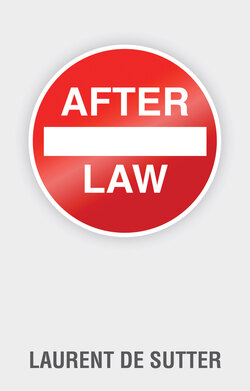Читать книгу After Law - Laurent de Sutter - Страница 8
ОглавлениеPRELUDE
§A. Law. For more than two thousand years, the West has lived under the rule of Law – a jealous rule, which tolerates infractions only insofar as they are the means by which offenders come to recognize anew its incontestable supremacy. This dominion was not built in a day, and has not failed to provoke resistance; but the legal proposition possessed, it would seem, a persuasiveness that its rivals did not: it won. Looking carefully at its contemporary form, it is possible to understand why: behind Law, there extends a whole domain of thought, valorizing order, reason, coherence, power and security. Even today, this domain of thought constitutes the default regime for everything, from university research to café conversation – from the perspective of this regime, anything escaping the parameters of the domain in question would lead to chaos. And the fear of chaos is without doubt the dominant psychological factor in the ecology of Law: the fear that something should flee, dodge, escape the lawful state of things, and in this way, reveal it to be nothing. The real is what Law fears: the whole history of the progressive triumph of the idea of Law in the West can be reread in light of this maxim, which might be thought of as embodying, in an originary way, its inexpressible. By this, we must understand that what Law fears most is not the real as such, but its own real, everything that traverses it and makes it possible – but that makes it possible only by being excluded from its discourse. Excluding its own real is, moreover, the most essential task to which the category of Law has been devoted since the beginning: Law is what works to exclude its own real – Law is what accomplishes its own closure on its blind spot. This beginning is Greek and philosophical, where the real that the category of Law sought to exclude was that of Right, as though Law only existed to make Right impossible except under its exclusive direction.1 In this way, the most precious juridical treasures were forgotten, and with them countless inventions allowing for the imagination of unregulated lives and societies that would yearn for movement. After Law, we will have to learn to remember them.
Note
1 NB. For the way in which ‘Law’ and ‘Right’ are used through this text, see the Translator’s Note.
Note
§A. – On the concept of the real: Jacques Lacan, The Seminar of Jacques Lacan IX: Identification, trans. Cormac Gallagher from unedited French manuscripts (London: Karnac Books, 2002); Alenka Zupancic, Ethics of the Real. Kant with Lacan (London: Verso, 2000); Slavoj Zizek, The Most Sublime Hysteric: Hegel with Lacan (Cambridge: Polity, 2014); Massimo Recalcati, Il vuoto e il resto. Il problema del reale in Jacques Lacan (Milan: Mimesis, 2013); Alain Badiou, À la Recherche du réel perdu [In Search of the Lost Real] (Paris: Fayard, 2015). See also Laurent de Sutter, Théorie du kamikaze [Theory of the Kamikaze] (Paris: PUF, 2016).
